A growing number of consultant doctors in Northern Ireland are leaving the UK's NHS to work in the HSE.
Dr Karen Humphries is one of these doctors from Northern Ireland making the decision to begin working for the HSE and said her "only regret is that I didn't jump probably a few years earlier".
"I had got to the point where driving into work was painful. You were close to tears. That has gone," she said.
Dr Humphries said bureaucracy, regimented structures and a "crumbling" health system led to her decision to quit her job in 2018 and become a consultant psychiatrist in Cavan/Monaghan Mental Health Services.
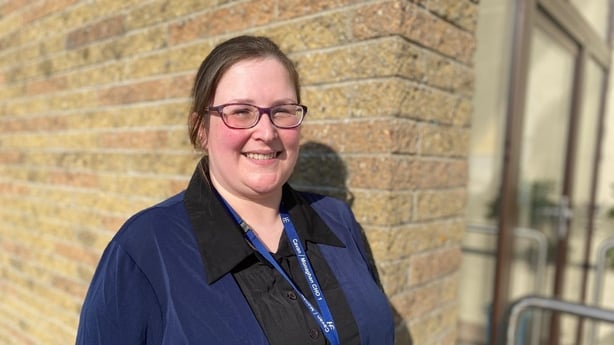
Money was not a motivating factor, she said, but she is now financially better off as well as happier in her job.
"Even after the much higher taxation rates in the Republic compared to the north, and even after you allow for the exchange rate, I am at least 50 to 70% better off per month than if I had remained as a consultant in the NHS."
"So, from a financial perspective, of course, it's much nicer. Of course I get paid more, but they could actually pay me exactly the same as I was earning in the NHS and just make my job better and I would have been happy."
Dr Humphries describes herself as a passionate believer in the NHS as a concept and could never have imagined working elsewhere when she graduated.
"Healthcare for all, regardless of the ability to pay, free at the point of access - that's what the entire world would love to have.
"It's a very unique and wonderful concept that has moved so much from that 1940s inception to a point where people cling to the idea. And the reality is the NHS has been underfunded for years."
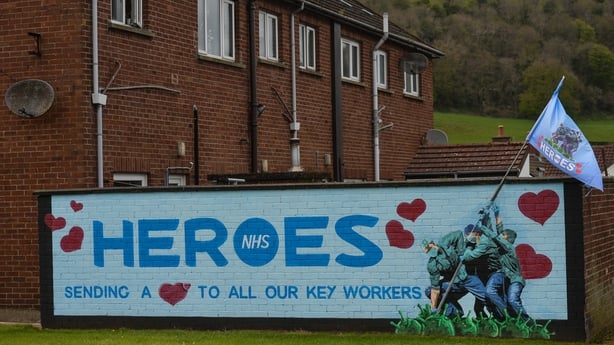
Due to the way data is recorded, there are no official figures for how many doctors in the North have taken up working in the Republic of Ireland.
However, information from the General Medical Council (GMC) - the UK regulator for doctors - appears to indicate some movement.
A Certificate of Good Standing (CGS) is a document required for UK-based doctors to work in the Republic of Ireland. Figures show the number of CGS requests rose from 507 in 2022 to 804 last year.
Applying for a CGS does not confirm a doctor has moved, but shows they are taking steps to do so. Of the 804 who applied last year, 632 remained registered to practice in the UK.
Sources in the medical community in the North have confirmed that an increasing number of consultants are taking up work across the border, attracted by better pay and better working conditions.
'Profound distress'
Earlier this year, then Northern Ireland health minister Robin Swann warned of "breakdown" in Northern Ireland’s health system, adding "every part of it is in profound distress."
Health services across the UK and Ireland are coming under pressure, but experts regard Northern Ireland as "broken".
NHS waiting lists in Northern Ireland are the worst in the UK, with patients waiting for more than half a million hospital appointments. For context, the population of Northern Ireland is 1.9 million.
Compared to the Republic of Ireland, waiting lists in Northern Ireland are twice as long. For people who have waited more than a year for an appointment, it is four times as long.
"We have a system here which is broken," said Tom Black, a Derry-based GP.
"The system in the Republic of Ireland is under stress and under strain, but we would regard it as coping."
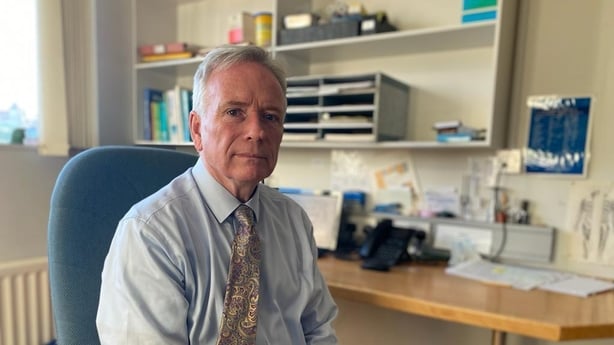
Dr Black added: "And it's certainly coping in terms of the waiting times of less than 12 months, whereas some of our waiting times are six to eight years.
"I mean, you might as well not have a service if somebody tells you you're going to wait eight years for a treatment."
Nicky from Co Down was told he would have to wait five to six years to see a consultant about severe pain in his shoulder.
He said the pain was so bad he could not sleep and could barely carry out basic activities like dressing or lifting a cup from the cupboard.
His mental health rapidly deteriorated along with his physical health. He ended up being hospitalised but said he was just discharged with pain relief.
Eventually he felt he had no choice but to pay to see a private consultant. The NHS is free at the point of delivery but funded by taxation.
Nicky said he worked all his life and paid his taxes, which means paying for a private consultant was effectively paying twice for a health service.
"It’s sad, that’s the situation we’re in," he said. "It’s sad, deplorable, angry."
'Unacceptably long' waiting lists
The Northern Ireland Department of Health points out recent figures show a continued reduction in waiting lists, but said they are still "unacceptably long."
"This is the result of lack of investment and transformation over many years."
"To deliver actions and see results will require long term and recurrent investment."
More people on waiting lists means more people developing complex health problems, which is a contributing factor to overcrowding in emergency departments.
"We haven't seen more attendances in the emergency department, but we have seen people who do come are sicker, have more complex problems and are more difficult to treat," said Dr Gareth Hampton, an emergency medicine consultant in Daisy Hill hospital in Newry.
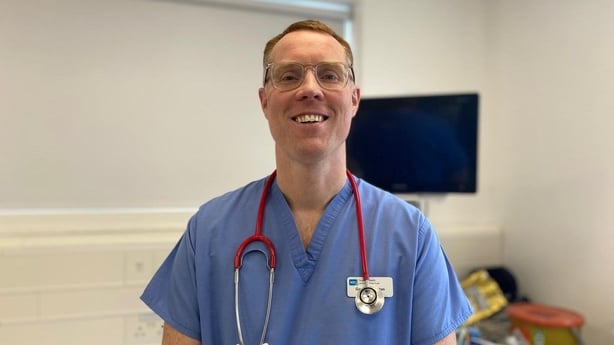
The health service has a target that no one should wait more than 12 hours in emergency departments to be treated, discharged or admitted.
In the past year, an average of around 9,500 people per month waited more than 12 hours. Fifteen years ago, the average was around 230 - a 41-fold increase.
"If you had told me that four years ago, I wouldn't believe you, who would wait 12 hours to be seen by a clinician? I just wouldn't have believed it. And now it's common place," Dr Hampton said.
The Royal College of Emergency Medicine said there is strong evidence more people died in association with emergency department delays in 2022 in Northern Ireland than died during the worst year of the Troubles.
Dr Hampton said he and his colleagues regard the system as broken.
"For most EDs, we're not at capacity. We're at 150% capacity, we're at 200% capacity. And that has been the norm at times for the last two years."
For all the issues, clinicians and patients point out that when the NHS works, it works well, especially when there is a sense of urgency.
Six years ago, when she was 27 years old, Claire Scott went to her GP about sudden bouts of nausea. Blood tests showed poor liver function. She was sent to Altnagelvin Hospital in Derry and soon after was diagnosed with pancreatic cancer.
Pancreatic cancer is called a less survivable cancer. Ms Scott’s case was red flagged and progressed through the system quickly.
Five days after attending hospital, she had major surgery. Two weeks later she was discharged and six months later she was back at work full time.
"I had a great experience in the NHS. I had very skilled doctors and nurses for the most part," she said.
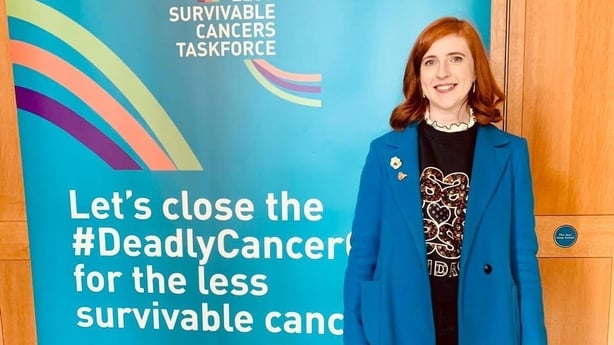
"But I would also say it's very lucky. And you know, luck and our healthcare shouldn't necessarily be so closely related, why should luck be a component in a successful outcome? So, it's very hard for me to separate the two. But what I will say is, when the NHS works, it works really well."
Ms Scott’s case shows the health system giving a patient the best possible outcome. However, she said being able to advocate for herself and proper access to a GP were crucial in her outcome.
However GP practices are struggling - 27 GP practices have handed their contracts back to the Stormont Department of Health since 2022.
This means they no longer intend to run it. It could be due to issues like retirement, recruitment problems or financial pressures. The Department of Health will then try to step in to find a new GP.
In Derry, Dr Black introduced a new service offering private appointments alongside NHS work. He said he had to do this to make up a budget shortfall or the practice would close.
Dr Black added that he was in some ways embarrassed about doing it, as it goes against his principles.
"And yet, if the choice was to allow my practice, which has been there for 100 years to close, or I would work harder and see patients at the end of the day privately to subsidise it. Well, that was the choice I would make."
'Crisis point'
Deirdre Heenan, Professor of Social Policy at Ulster University, believes problems in the health service come back to a lack of political decision-making on required transformation of services.
The Northern Ireland Executive has been back in place since February this year but has yet to produce a Programme for Government that could detail action for the health service.
"I think at the moment we are really at a crisis point," Prof Heenan said.
"We are looking desperately for leadership, particularly in Northern Ireland where we have had promises after promises about addressing the system. The difficulty for us is we are constantly told by our politicians we don’t have the money."
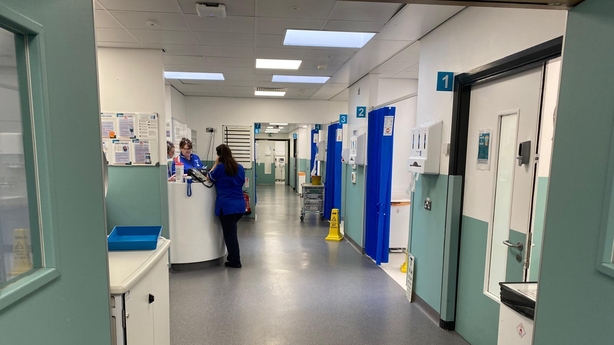
"Northern Ireland, as a region of the UK, spends more per head of population than any other region and we have the worst outcomes, so it can't just be about money."
"I think what we want from our politicians is leadership, bold leadership."
Health systems are complex. In the North, sometimes it works well, and Dr Hampton worries that they are being eroded.
"I think it's a big part of our culture, our identity and how we work that we want to see the sick get treated regardless of money or not."
"That’s a strong ethos, it’s deep rooted within our society, and it should be guarded at all costs, because if you lose it, you lose something that is beyond just a healthcare provision."
"It’s about how a human being should be valued. So that's why it's so important. It's a very strong ethical issue that we should not let go of easily."
Our Lives in the North, a new podcast series from RTÉ Radio 1, available on the RTÉ radio app or wherever you get your podcasts.






